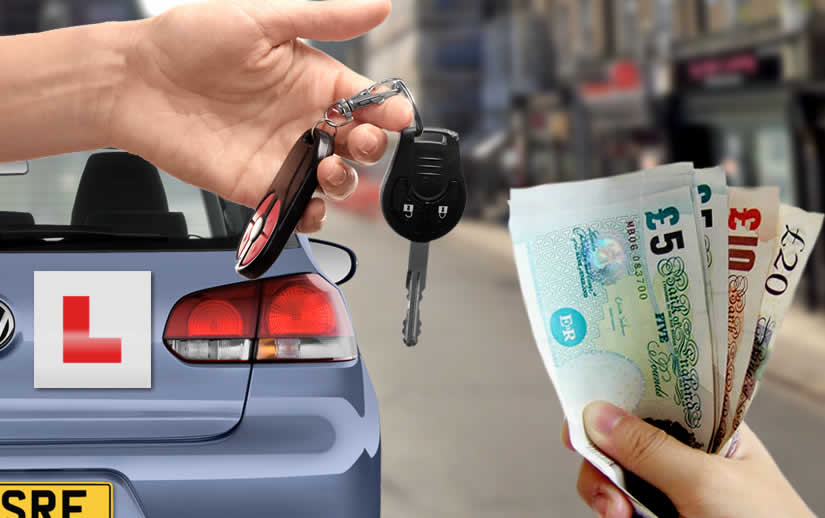Depending on where you live, driving lessons range in price from between £25 to £30 per hour. If we take an average hourly rate of £28 per hour and multiply that by 45 – the average amount of professional driving lessons required to reach test standard, we come to a total of £1,260.
That’s £1,260 just on driving lessons alone and not taking into account provisional licence fees, test fees, costs of study materials etc. Therefore, it’s little wonder on why people look for ways on how to save money on driving lessons. Regardless of whether you want automatic or manual driving lessons, there are ways to save money. Here are our top six tips on how to save money on driving lessons.
1. Look for an Independent Driving Instructor
An independent driving instructor is an individual that runs their own driving school. This means that they do not have to pay an ongoing franchise fee in return for pupils, such as instructors do when working for a national driving school.
This doesn’t guarantee that you’ll save money by choosing a local independent driving instructor, but as they do not have the high franchise fees to pay, it often means they’re able to offer driving lessons at a cheaper price. By carefully choosing your instructor, you could easily save £2 or £3 off the price of hourly lessons.
However, what’s more important than finding the cheapest instructor that you can find, is to choose an instructor that you get on with, one that you feel comfortable and relaxed with, and an instructor offers you a teaching style that’s easy for you to understand. To do this, you may need an introductory, or ‘assessment’ lesson with two or three different instructors to find the right one. Choosing the wrong instructor may end up costing you more money. See how to find a good driving instructor for further information.
2. Take Advantage of Driving Lesson Deals
To entice those looking for driving lessons, driving schools will often offer discounted deals for new learners. You’ll often see deals such as ‘5 driving lessons for £99’, or ‘book 6 driving lessons and get two free’.
However, before taking advantage of any deals, check what prices you’ll be paying when the deal has finished. If normal lesson prices are high, it’ll likely negate any savings made from the deals.
3. Block Book Your Driving Lessons
Block booking is an excellent way to save money on driving lessons. Almost all driving schools offer the ability to block book lessons in return for discounts.
You can usually block book in increments of 10 hours, but the best savings are usually made if you block book the entire course up front. This does mean that you’ll need to pay for all lessons in one go, but it does offer the chance to make maximum savings.
By block booking 10 hours, or better still the entire course, you can save £2 or £3 off the price of regular lessons. Additionally, there’s no harm in negotiating. If the instructor offers you a discount, ask for a better one – you’ll not get if you don’t ask. See what are block driving lessons for further information.
4. Take Two Hour Lessons
Most driving instructors offer various driving lesson durations from one hour, one and a half hours, to two or more hours. One driving lesson is 60 minutes, so taking a two hour lesson will be two driving lessons back-to-back. Taking longer two hour lessons means you’ll be getting more for your money and may even save you money long-term and this is why:
Part of a driving instructor’s training is that they have to recap on what had taken place on the previous lesson. By the time you’ve got yourself set up and ready to drive and gone over highlights the previous lesson, plus areas that require additional emphasis, that’s 20 to 30 minutes gone. If you’re taking just a one hour lesson, that could be almost half of it gone already.
Taking longer driving lessons means you’ll spend less time going over previous lessons and more time learning new skills. Learning more intensively by having longer lessons also means you’re less likely to need additional lessons at the end of your course, potentially saving you money long-term.
5. Get as Much Private Practice as Possible
Taking driving lessons with friends or family is not only free, but provides valuable driving experience. What is important however, is that you only use private driving lessons to gain experience on what your instructor has already taught you.
We’ve seen this before; a learner has been taught incorrectly during private practice and the instructor has to undo what’s been incorrectly taught and start again. This ultimately takes more time and potentially requires more lessons.
If you use private driving lessons in the correct way, the extra experience will help to increase your chances of passing the driving test first time. If you pass the test, it then means no more driving lessons.
6. Book a Driving Test Only When Your Instructor Says You’re Ready
If you book a driving test too early and you’re not ready, chances are you’ll fail. Due to the backlog of driving tests, if you fail, you’re going to have to wait two or three months before you can sit your next test. In some areas, driving test waiting times are as long as five months.
What that means in reality, is that you’re going to need consistent driving lessons to ensure your skills are on top form. These extra lessons will of course come at a price, so always aim to ensure that you’re test-ready.
